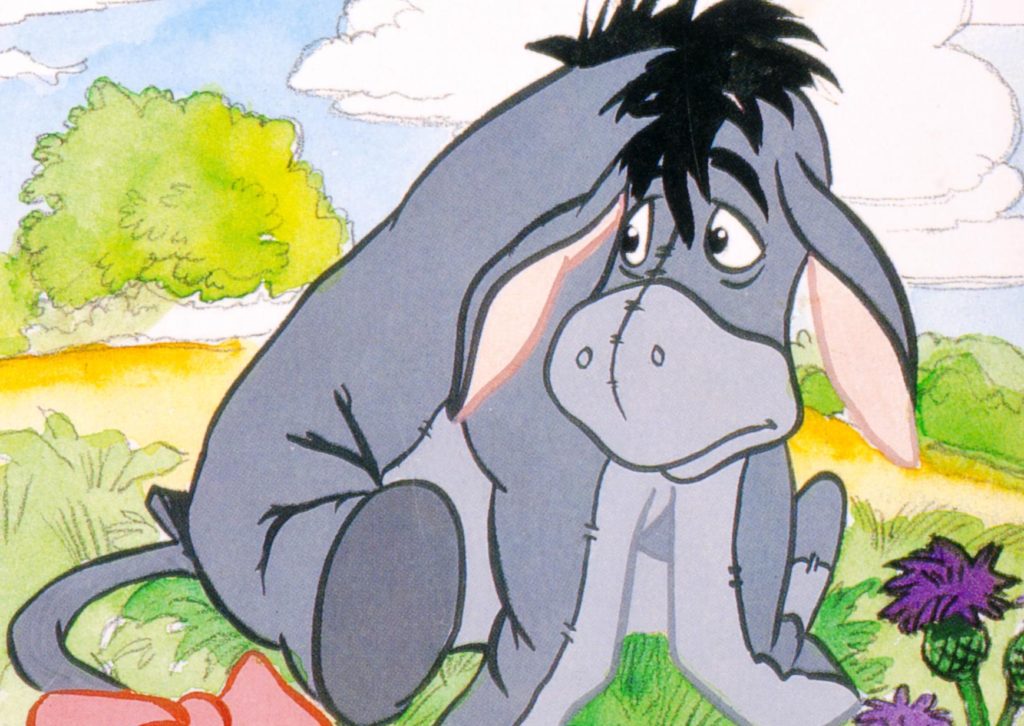By Laura Ward
A poignant piece of fiction by blogger Kathryn Wallace has been making the rounds on social media. In the story, Pooh and Piglet realize that they haven’t seen Eeyore in a long time and decide to check in on him. In a glum voice, Eeyore explains that right now he feels, “rather Sad, and Alone, and Not Much Fun To Be Around At All” and that is why he hasn’t bothered them, because he assumes that they would not want to hang out with someone who is feeling this way. To Eeyore’s surprise, Pooh and Piglet sit down on either side of him. The three friends sit in silence and almost imperceptibly Eeyore starts to feel a tiny bit better because Pooh and Piglet are there. No more; no less.

As a bereavement counselor, I find that grievers often feel a similar sense of isolation. Friends who were initially very supportive and present following a death return to their own lives. Meanwhile, grievers struggle to cope with their new reality and a roller coaster of emotions. It is common for bereaved people to express frustration with their ability to cope “effectively” and the resulting loss of esteem can lead them to assume that others could not possibly understand or accept them in their current state. In the wake of loss, the life, identity and worldview of the grieving person has changed dramatically. They are having to reorganize themselves around the death of a person who had become an integral part of their identity, a buoy on their life journey. Their struggle to adjust, although intense, is a normal part of grief. Mourning the death of someone with whom we have had a significant attachment is a natural, biological process, one which occurs over years, not days or months and is a necessary part of integrating the loss. The path through grief is fraught with difficult and complex emotions. This path is one that we will all walk at some point in our lives, it’s not something we choose, but rather something that arises from having loving relationships.
Research has clearly demonstrated that humans are automatically wired to be both helpful and empathetic. When someone we care about is grieving, we genuinely want to find a way to offer comfort, but we may struggle to find the right sentiment or gesture. The truth is that there is no “fix” for grief, no perfect thing to say that will make it better, and it’s true that you might say the wrong thing even with the very best of intentions. Alan Wolfelt, Ph.D. explains that companioning a grieving friend is “going into the wilderness of the soul with another human being; it is not about thinking you are responsible for finding the way out”. In grief, the wilderness of the soul can be fraught with feelings of uncertainty, a loss of control, ambiguity, sadness and anxiety. As humans, these are all emotions we tend to avoid, naturally preferring the light and predictable. Therefore, our instinct is often to help our friend find their way out of this uncomfortable place rather than simply be there with them. There is no greater gift we can give another person than to accept them, exactly where they are at any moment, without expectation. Be comforted in knowing that your friend has an innate ability to heal, albeit on their own timeline. Your role is to be responsive and respectful of their unique process and show up in whatever way you are able.
What role you play depends on the type of relationship you and your friend have established. Are you someone who can elicit a quick laugh or enjoy a night on the town? It may be a while before your friend will be able to feel joy, but at some point, they will need to take a break from their grief, have fun and share that laugh. Be patient but keep in touch with your friend and let them know that you would like to spend time with them when they are ready. Verbalize your support if they need to cancel or leave an outing early. Are you someone who shows your love by doing things for others? After a death, the list of tasks that need to be completed can be overwhelming. You can ease the burden by assisting with daily chores such as meals, lawn care and cleaning or by helping plan the funeral or memorial service. Continue your offers of help long after the death and if it’s something that you can do without asking, then just do it. Lastly, if you are a Pooh or a Piglet and have the capacity to journey into the wilderness with your friend, to sit silently and offer emotional comfort, then let love and tenderness lead the way. Regardless of the type of support you can provide a grieving friend, it matters, having people offer support during our darkest times is what gives us the strength to go on and is an integral part of our healing process.